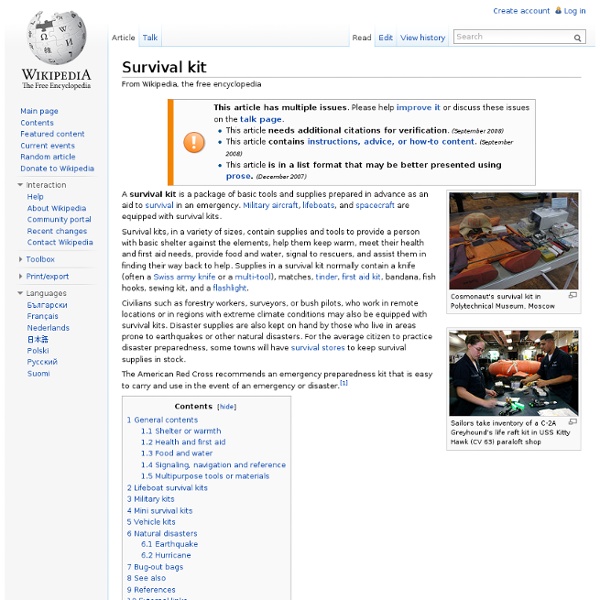Category:Survival skills
Authors, activists, practitioners of survival skills and survivalism, and related people should be in Category:Survivalists. Books, novels, manuals, pamphlets, and other literature about survival skills and survivalism should be in Category:Books about survival. Other media (films, television series, music, etc) about survival skills and survivalism should be in Category:Survival skills media. Subcategories This category has the following 6 subcategories, out of 6 total. Pages in category "Survival skills" The following 42 pages are in this category, out of 42 total.
AF Manual 64-4 Survival USAF July 1985
SAS Survival Handbook: How to Survive in the Wild, in Any Climate, on Land or at Sea: Amazon.de: John 'Lofty' Wiseman: Englische Bücher
Survival skills
Survival skills are techniques a person may use in a dangerous situation (e.g. natural disasters) to save themselves or others. These techniques are meant to provide basic necessities for human life: water, food, shelter, habitat, the ability to think straight, to signal for help, to navigate safely, to avoid unpleasant interactions with animals and plants, and cure any present injuries. Survival studies have shown that those who adapt successfully in a stress situation share some some common attributes which set them apart from those who don't. A survivor possesses determination, direction, and a belief in the goodness of mankind.[1] Survival skills are often basic ideas and abilities that ancient humans have used for thousands of years. First aid[edit] First aid (wilderness first aid in particular) can help a person survive and function with injuries and illnesses that would otherwise kill or incapacitate him/her. Shelter[edit] Fire[edit] Water[edit] Food[edit] [edit] Common myths[edit]
Wilderness medical emergency
Wilderness medicine is defined as a medical emergency which takes place in a wilderness or remote setting which is at least 60 minutes away from definitive care (hospital, clinic, etc.) and present unique challenges that may require specialized skills, treatment techniques, and knowledge in order to manage the patient for an extended period of time before being evacuated.[1] Mass casualty incidents[edit] These are incidents which produce an elevated number of injuries, such as blizzards, earthquake, avalanche, landslide, floods and forest fire. Triage is a concern as well as location of victims who may be in dense foliage, rocky and remote locations or covered in mud, snow and debris. Helicopters are used to access remote locations during natural disasters. Response[edit] Extrication and evacuation[edit] First aid[edit] Locating the victim precedes assessment and intervention and in the case of wilderness response is often a difficult matter. Specific conditions[edit] Certification[edit]
CODY LUNDIN: outdoor survival, primitive living skills, and urban preparedness courses
List of wilderness medical emergencies
The following is a list of symptoms and conditions that signal or constitute a possible Wilderness medical emergency. Injury and illness[edit] Infections specific to wilderness[edit] Lyme disease infectionMalaria infection associated with expeditionsNecrotizing FasciitisRabies infectionSalmonella poisoning associated with expeditions Neurological and Neurosurgical[edit] Respiratory[edit] Anaphylaxis associated with stingsHypovolemic shock (due to hemorrhage) associated with climbing falls, kayak crashes, etc.Septic shock
Category:Survivalism
Authors, activists, practitioners of survival skills and survivalism, and related people should be in Category:Survivalists. Books, novels, manuals, pamphlets, and other literature about survival skills and survivalism should be in Category:Books about survival. Subcategories This category has the following 4 subcategories, out of 4 total. Pages in category "Survivalism" The following 11 pages are in this category, out of 11 total.
Survivalism
Movement of individuals or households preparing for emergencies and natural disasters Use of the term survivalist dates from the early 1960s.[2] History[edit] 1930s to 1950s[edit] The origins of the modern survivalist movement in the United Kingdom and the United States include government policies, threats of nuclear warfare, religious beliefs, and writers who warned of social or economic collapse in both non-fiction and apocalyptic and post-apocalyptic fiction. The Great Depression that followed the Wall Street Crash of 1929 is cited by survivalists as an example of the need to be prepared.[4][5] 1960s[edit] The increased inflation rate in the 1960s, the US monetary devaluation, the continued concern over a possible nuclear exchange between the US and the Soviet Union, and perceived increasing vulnerability of urban centers to supply shortages and other systems failures caused a number of primarily conservative and libertarian thinkers to promote individual preparations. 1970s[edit] Bruce D.




-------------------------------------------------------------------------------------------------------------------------------------------------------------------
2025-08-03 20:30
by raviii Aug 3